
 i_need_contribute
i_need_contribute

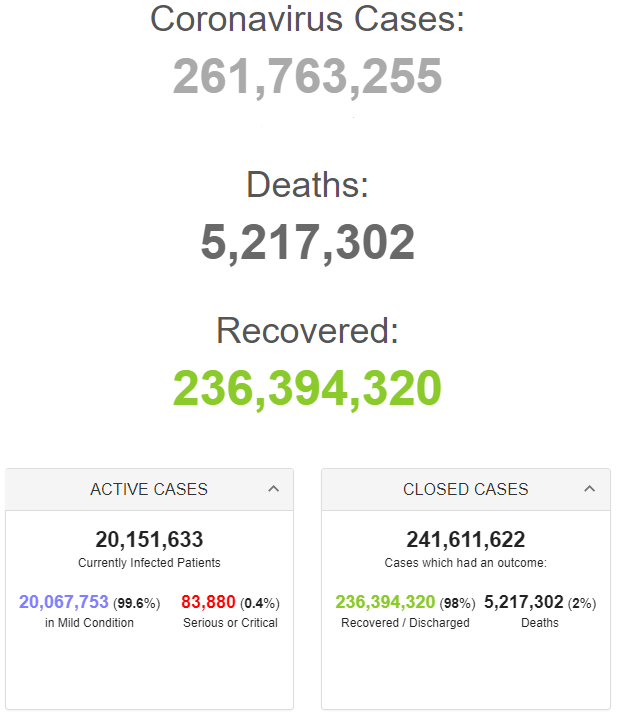

Retrieved from: https://www.worldometers.info/coronavirus/
The World Health Organization (WHO) said on Sunday that it is not yet clear if the new Omicron coronavirus variant is more transmissible compared to other SARS-CoV-2 variants or if it causes more severe disease.
"Preliminary data suggests that there are increasing rates of hospitalization in South Africa, but this may be due to increasing overall numbers of people becoming infected, rather than a result of specific infection with Omicron," it said.
However, in a statement, the agency reiterated that preliminary evidence suggests there may be a higher risk of reinfection from the variant.
The WHO said it is working with technical experts to understand the potential impact of the variant on existing countermeasures against COVID-19 disease, including vaccines.
"There is currently no information to suggest that symptoms associated with Omicron are different from those from other variants," the WHO said.
"Initial reported infections were among university studies —younger individuals who tend to have more mild disease — but understanding the level of severity of the Omicron variant will take days to several weeks," it said.
PCR tests continue to detect infection with Omicron - which was first detected in South Africa earlier this month - and studies are ongoing to determine whether there is any impact on rapid antigen detection tests, the WHO said.
Retrieved from: https://www.reuters.com/business/healthcare-pharmaceuticals/who-says-it-is-not-yet-clear-if-omicron-causes-more-severe-disease-2021-11-28/
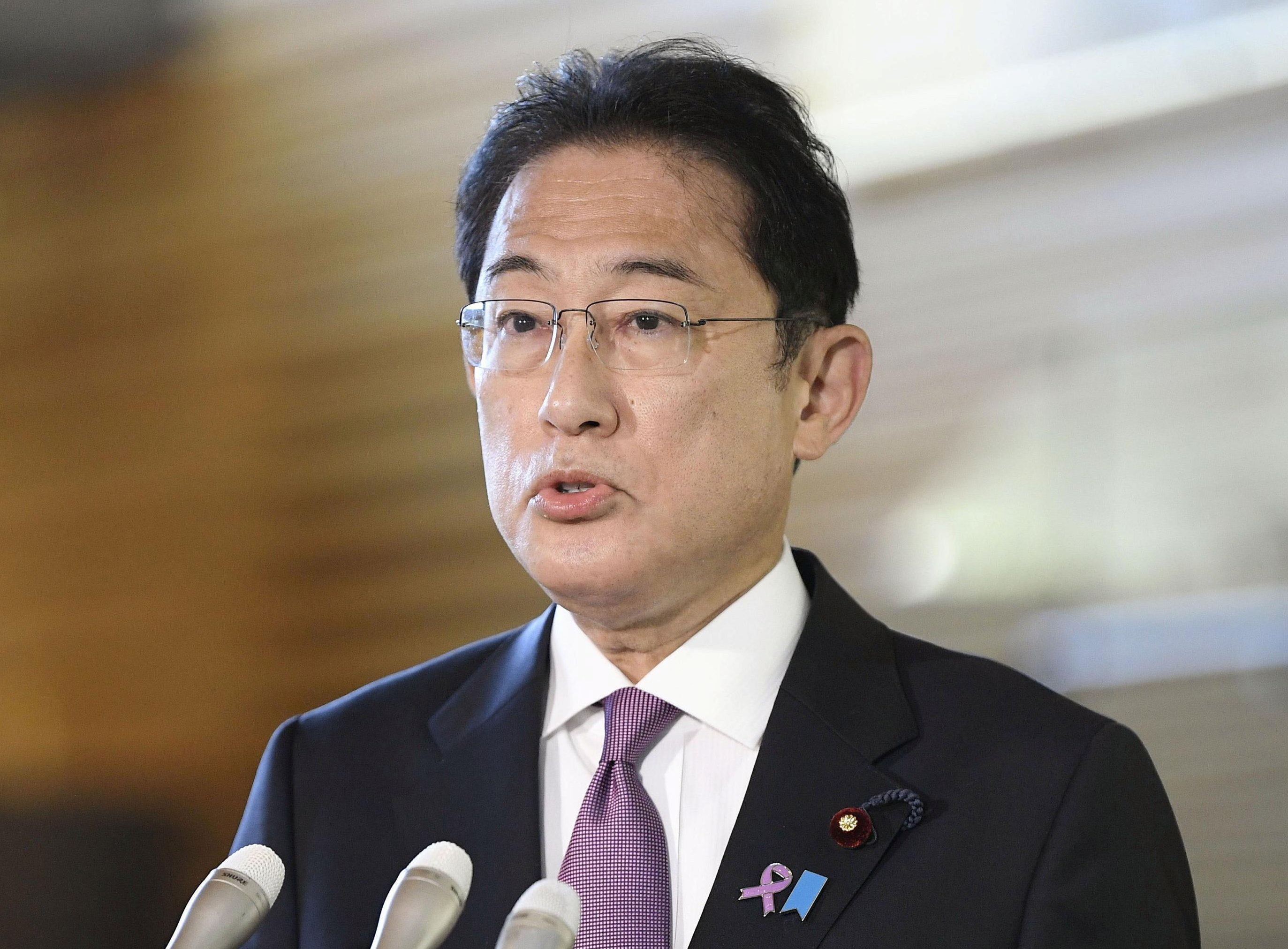
Japan's Prime Minister Fumio Kishida speaks to media as he annnouces that the government would release some of its oil reserves in concert with the United States, at his official residence in Tokyo, Japan November 24, 2021. Mandatory credit Kyodo/via REUTERS
Japan, the world's third-biggest economy, will close its borders to all foreigners, while Australia's plans to re-open to skilled migrants were also in doubt as nations scrambled on Monday to rein in the spread of the Omicron variant of the coronavirus.
Markets regained some composure as investors await more details of the variant following a freefall last week after news of its emergence ignited fears that fresh curbs could upend a nascent economic revival from a two-year pandemic.
Potentially more contagious than prior variants, Omicron, first identified in South Africa, has been found in Australia, Belgium, Botswana, Britain, Canada, Denmark, France, Germany, Hong Kong, Israel, Italy, the Netherlands and South Africa.
It could take "days to several weeks" to understand the level of severity of the variant, says the World Health Organization (WHO), which has dubbed it a "variant of concern".
Japan will close its borders to all foreigners from Tuesday, Prime Minister Fumio Kishida said.
"We are (taking measures) with a strong sense of crisis," he had told reporters earlier, although no Omicron infections have yet been found in Japan.
Australia is to review plans to re-open from Dec. 1 to skilled migrants and students, Prime Minister Scott Morrison said on Monday, adding it was a "bit too early" to reinstate two-week hotel quarantine for foreign travellers.
"So we just take this one step at a time, get the best information, make calm, sensible decisions," Morrison told broadcaster Nine News. read more
A national security panel will meet later in the day to assess border easing due from Wednesday, he added, while leaders of states and territories are set to meet.
Morrison called for calm as the severity, transmissibility and vaccine resistance of Omicron had not been determined, echoing remarks by the WHO. read more
Symptoms of Omicron are so far mild and could be treated at home, a South African doctor, one of the first to suspect a different variant, has said. read more
TRAVEL CURBS
Countries from Indonesia to Saudi Arabia have imposed travel curbs for visitors from southern Africa. read more
Singapore has deferred the start of vaccinated travel lanes with Middle Eastern countries, such as Qatar, Saudi Arabia and the United Arab Emirates, in view of their role as "transport nodes" for affected countries, its health ministry said.
The wealthy southeast Asian city-state and neighbouring Malaysia re-opened their land border, one of the world's busiest, allowing vaccinated travellers to cross after a shutdown that lasted nearly two years. read more
Britain said it would call an urgent meeting of G7 health ministers on Monday.
In the most far-reaching effort against the variant, Israel is to ban the entry of foreigners and re-introduce counter-terrorism phone-tracking technology, it has said. read more
South Africa has denounced the measures as unfair and potentially harmful to the economy, saying it was being punished for its scientific ability to identify variants early.
"The prohibition of travel is not informed by science, nor will it be effective in preventing the spread of this variant," President Cyril Ramaphosa said on Sunday.
"The only thing (it) ... will do is to further damage the economies of the affected countries and undermine their ability to respond."
President Joe Biden will give an update on the variant and the U.S. response on Monday, the White House said in a statement. read more
It will take about two weeks to get definitive information about the transmissibility and other features of Omicron, Dr. Anthony Fauci, the top U.S. infectious diseases official, has told Biden, it added.
Fauci believes existing vaccines "are likely to provide a degree of protection against severe cases of COVID", the White House said.
Retrieved from: https://www.reuters.com/world/spread-omicron-variant-forces-nations-rethink-plans-global-travel-2021-11-29/
By Declan Walsh and Lynsey Chutel
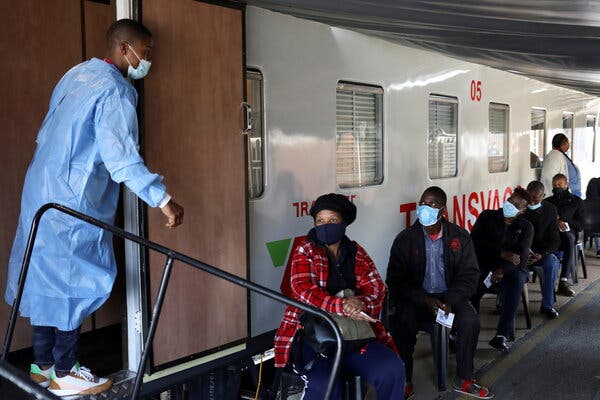
A health worker greeted people at a vaccine pop-up center in August, in East Rand, South Africa, as part of a measure to help the government speed up the inoculation campaign in the country’s remote communities.Credit...Siphiwe Sibeko/Reuters
On the face of it, the emergence of the Omicron variant is the unhappy fulfillment of expert predictions that the failure to prioritize vaccinations for African countries would allow the coronavirus to continue to circulate and mutate there, imperiling the world’s ability to move beyond the pandemic.
As Western nations kept most of the global vaccine supply for themselves, African countries were denied access to doses or could not afford them. Around 10 percent of people in Africa have received one dose of a vaccine, compared with 64 percent in North America and 62 percent in Europe.
But the problem is changing shape. In recent weeks, vaccines have started to flow into Africa, and the new challenge is how to rapidly scale up vaccinations — as South Africa demonstrates.
“We haven’t completely overcome the problem of vaccine supply to lower-income countries,” said Shabir Madhi, a virologist at the University of the Witwatersrand in Johannesburg. “But where they are available, countries are struggling to scale up.”
Scientists in South Africa, which has the most sophisticated genomic sequencing facilities on the continent, were the first to announce the detection of the new variant, after it was found in four people in Botswana.
South Africa has a better vaccination rate than most countries on the continent: Just under one-quarter of the population has been fully vaccinated, and the government said it has over five months’ worth of doses in its stores. But they are not being administered fast enough.
Vaccinations in South Africa are running at about half the target rate, officials said last week. To prevent vaccines from expiring, the government has even deferred some deliveries scheduled for early next year.
In a briefing on Sunday to announce the country’s response to the new variant, President Cyril Ramaphosa said his cabinet was considering making vaccines mandatory for specific locations and activities. Before enforcing the new rules, though, a task team will investigate “a fair and sustainable approach.”
In a country where vaccines are free, this was a more desirable approach than imposing additional lockdown restrictions as he said that new virus infections in general more than tripled in a week. Masks remain mandatory in public, and a curfew is in place from midnight to 4 a.m.
“We know enough about the variant to know what we need to do to reduce transmission and to protect ourselves against severe disease and death,” said Mr. Ramaphosa. “The first, the most powerful, tool we have is vaccination.”
But the problem is not just a product of the misinformation-driven hesitancy that has plagued vaccination efforts in the West. In fact, some studies suggest it’s a small part of the problem in South Africa.
Instead, the inoculation campaign has been slowed by a complex range of logistical, financial and even political issues. And Western actions are partly to blame.
Many African countries lack the cold storage facilities or logistics chains for a large-scale vaccination campaign. Dilapidated health systems mean a lack of clinics or qualified personnel to administer vaccines.
With Western countries hogging vaccine supplies for most of this year, and doses from India halted as cases surged in there, many African countries have relied on donations. But some of those vaccines have landed close to their expiration date, giving countries a narrow window in which to safely deliver them.
And many Africans are constrained by time and money. They may lack the bus fare to reach a distant vaccination center — or be reluctant to stand in line for hours if there’s a risk of missing work, or losing a job.
Misinformation and cultural factors matter, too. Africa has a long history of vaccinating young children against diseases like polio, but a mass vaccination drive among adults is “very, very unusual” Dr. Matshidiso Moeti, the World Health Organization’s Africa director, told reporters last week.
Even nurses and doctors are prone to believing false tales of dangerous side effects: Recent studies in Ghana and Ethiopia found that fewer than 50 percent of health workers intend to get vaccinated, Dr. Moeti said.
In South Africa, race is a factor: Researchers at the University of Johannesburg found that white people were more vaccine hesitant than Black people — but were more likely to have been inoculated because they had access to better health care.
The race to vaccinate Africans is progressing. In the past eight weeks, 30 African countries have administered 80 percent of doses received, according to the World Health Organization. Only Djibouti and the Democratic Republic of Congo administered fewer than 20 percent of doses received.
Still, there is a long way to go. So far, wealthy countries have delivered just 14 percent of the 1.7 billion doses promised to low- and middle-income countries by next September, according to data collated by Our World in Data, a project at Oxford University.
And no matter how quickly those doses arrive, experts say African countries need support to help get them into people’s arms.
In Kenya this month, the Secretary of State Antony J. Blinken outlined measures to help Kenyans overcome such “last mile” obstacles through the Global Covid Corps, a new public-private partnership aimed at overcoming logistical and delivery hurdles. As fear of the new variant spreads, the sense of urgency around such programs is likely to grow.
Retrieved from: https://www.nytimes.com/live/2021/11/24/world/covid-vaccine-boosters-mandates/new-mexico-vaccines
By Emma Bubola
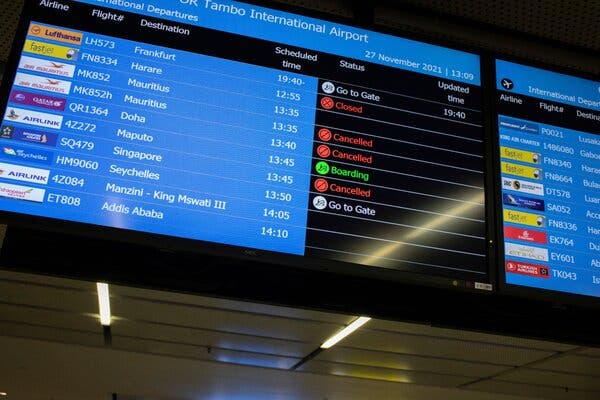
A flight information board shows canceled flights in Johannesburg on Saturday.Credit...Kim Ludbrook/EPA, via Shutterstock
Dutch health officials said on Sunday that they had found cases of the Omicron coronavirus variant among passengers who had arrived from South Africa on Friday, a clear sign that the virus was crossing borders.
Additional cases could emerge, as health officials were still examining test samples, said Hugo de Jonge, the country’s health minister. The 61 people who tested positive, 13 with the new variant, were isolating. The passengers were among more than 500 who arrived on two separate flights.
A growing list of countries is scrambling to respond to the new, highly mutated version of the virus, which was first detected in Botswana and South Africa and which has sent ripples of panic through governments and markets. Japan on Monday joined Israel and Morocco in sealing its borders to all foreign travelers. Morocco’s ban applies to its own citizens.
Health officials in Australia and Denmark on Sunday both confirmed cases of the variant in travelers recently arriving from southern Africa. Australia placed two people in quarantine after they tested positive for the variant on arrival on a Qatar Airways flight on Saturday from Doha.
Tracking Omicron
See which countries have reported cases of the Omicron variant.
And British health officials said Sunday a third case had been detected in an individual who had spent time in central London. They said the case was linked to travel to southern Africa. France has identified eight possible cases, while the government in Ontario confirmed two cases in Ottawa on Sunday.
In South Africa, President Cyril Ramaphosa said in a televised address on Sunday that the country was bracing for a new wave of infections ahead of the holiday season.
He also said his cabinet was considering making vaccines mandatory for specific locations and activities.
Nationally, new infections of the virus overall have more than tripled in a week, he said.
Mr. Ramaphosa did not detail what share of new cases might be of the Omicron variant, but said that the variant appeared to be responsible for driving new cases in the province of Gauteng, the economic hub of the nation.
The variant “is now showing up in all other provinces in our country,” Mr. Ramaphosa said.
The W.H.O. warned on Friday that Omicron was a “variant of concern,” the most serious category the agency uses for such tracking, and said that its numerous genetic mutations could help it spread more quickly, even among vaccinated people.
In an update on Sunday, the W.H.O. said that Omicron may pose an increased risk of reinfection, but it was not yet clear if it causes more severe disease or transmits more easily than other variants. The agency said that studies are underway.
Scientists cautioned that relatively little is known about the variant, and that only a small number of confirmed cases have surfaced globally. They have also said that existing vaccines were likely to protect against it. Still, there are worries that Omicron could have spread more widely before scientists in South Africa discovered it last week.
Some experts said that the rush to reintroduce travel bans and border closures was premature and would unfairly punish African countries that have already suffered from delayed and insufficient vaccine supplies caused in large part by wealthier countries hoarding doses.
The European Union acted quickly by announcing Friday that it would restricted travel to and from seven countries in southern Africa — Botswana, Eswatini, Lesotho, Mozambique, Namibia, South Africa and Zimbabwe. The United States and South Korea have targeted those countries and Malawi, while Britain has restricted travel with those eight nations and Angola and Zambia.
By Ron DePasquale
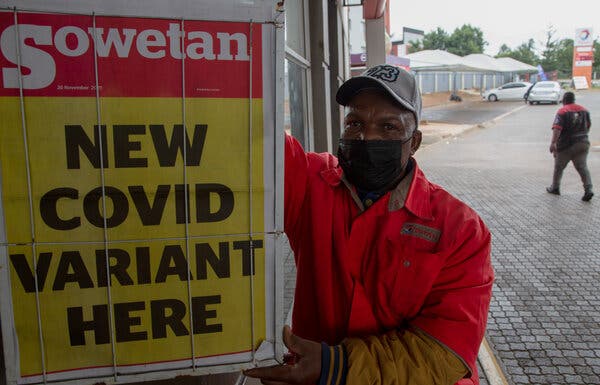
A newspaper headline in Pretoria, South Africa, on Saturday.Credit...Denis Farrell/Associated Press
The cascade of travel closures sparked by the emergence of the Omicron variant has triggered resentment among Africans who believed that the continent was yet again bearing the brunt of panicked policies from Western countries, which had failed to deliver vaccines and the resources needed to administer them.
Richer countries, having already hoarded vaccines for much of 2021, were now penalizing parts of the world that they had starved of shots in the first place, scientists said.
“Told you so,” said Francois Venter, a researcher at University of the Witwatersrand in Johannesburg, referring to warnings from African researchers that delaying vaccinations there risked the emergence of new variants. “It feels like these rich countries have learned absolutely nothing in terms of support.”
The sense of outrage was most visceral in South Africa, where business leaders predicted that travel bans by Western nations would inflict a dire economic toll, especially on tourism. In the arrivals halls of Johannesburg’s O.R. Tambo International airport, Ronald Masiwa, a tour operator, watched with dread as the information board flipped to red, displaying cancellation notices. Three clients had already canceled trips overnight, and he feared that many more would follow.
In South Africa, December is traditionally the high season for tourism, one of the country’s biggest industries, and operators had been banking on a surge in visitors from Britain, which had removed South Africa from its “red list” only last month.
“This is devastating,” said David Frost, chief executive officer of the Southern Africa Tourism Services Association. “Many companies have been hanging on by their fingernails, and this is going to wipe them out. It’s going to be dire for conservation, and it’s going to be dire for people in rural areas where tourism is the only economic generator.”
South Africa’s number of daily infections — 2,828 on Friday — was a small fraction of case counts in countries with similarly sized populations, like Germany and Britain, not to mention the United States. For Mr. Frost, the hurried measures were the mark of a blatant double standard.
In South Africa, most of the 22 cases of the Omicron variant detected as of Saturday were in Pretoria, the capital city north of Johannesburg. With fears growing that the government would announce a new lockdown, a sense of foreboding hung over one shopping mall, festooned with Christmas decorations, where Mary Njuguna sells beaded jewelry and woven handbags.
The pandemic had already caused the price of imports to soar, and goods from Kenya and Malawi that once arrived in one week now took months, she said. Talk of a new lockdown made her fear what might come next.
“It’s a big, big mess,” Ms. Njuguna said.
The travel bans resonated widely in a continent where they were seen as a mark of Western double standards. Nanjala Nyabola, a Kenyan writer, said that border closures appeared to be dictated by politics and not public health concerns.
“If you look at the way the numbers are going, we should be thinking about bans on Europe and United States,” she said. “But the border closures are not tied to the public health crisis in front of us.”
Here’s a round-up of the day’s leading Covid stories:
· G7 health ministers are to hold an emergency meeting on Monday on the new Omicron Covid-19 strain, as experts race to understand what the variant means for the fight to end the pandemic.
· Omicron has been detected in at least a dozen countries including Britain, Germany, France, Denmark, Israel, Canada,Hong Kong, Australia and South Africa.
· Japan will close its border to all foreign visitors from Tuesday to prevent the spread of Omicron, prime minister Fumio Kishida said.
· South Africa’s president, Cyril Ramaphosa, has criticised border closures and called on nations to lift the travel bans “before any further damage is done to our economies”.
· Singapore and Malaysia have re-opened one of the world’s busiest land borders, allowing vaccinated travellers to make the crossing after nearly two years of closure due to the Covid-19 pandemic, Reuters reports.
· Canada’s health minister says the country’s first two cases of Omicron have been found in Ontario after two individuals who had recently travelled from Nigeria tested positive. They are the first cases to be detected in North America.
· The Philippines has launched an ambitious drive to vaccinate nine million people against Covid-19 over three days, deploying security forces and using tens of thousands of volunteers to help administer the programme.
· A case of the Omicron variant has been confirmed in Australia’s Northern Territory, while New South Wales has also confirmed two and is investigating the possibility of two further cases
· The top US infectious disease official, Dr Anthony Fauci, has told president Joe Biden it will take about two weeks to have definitive information on the new variant and has warned the US has “the potential to go into a fifth wave” of coronavirus infections.
· Authorities in the Netherlands detected at least 13 cases of the Omicron variant from recent flights into Amsterdam from South Africa.
· The 194 member states of the World Health Organization have agreed to launch pandemic treaty negotiations as the world prepares to learn the lessons of Covid for the next pandemic.
· The UK reported 37,681 new Covid cases and 51 deaths, with the government vaccine watchdog suggesting the vaccine booster drive could be accelerated as soon as Monday to suppress cases.